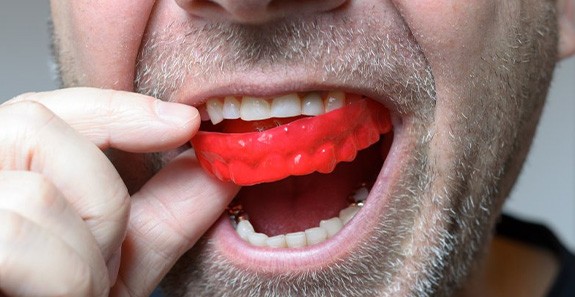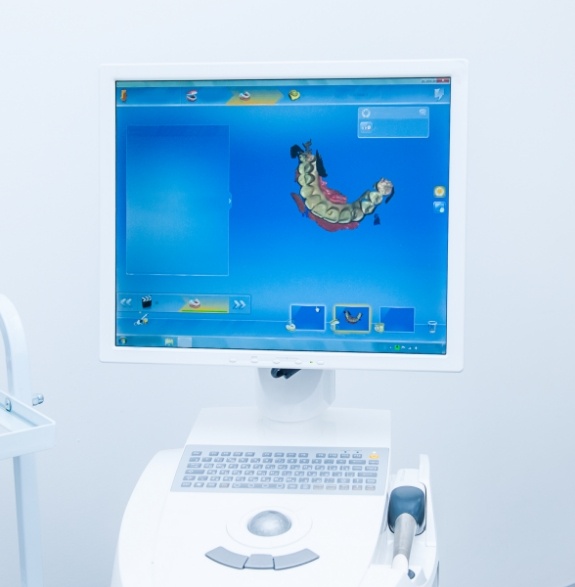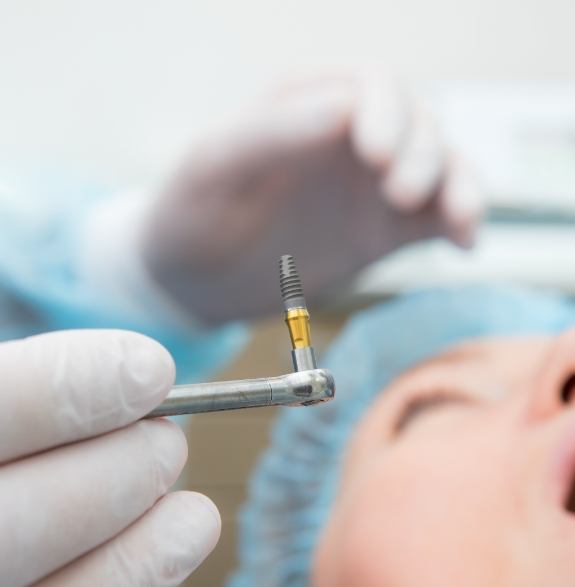Looking for a lifelike solution to replacing a missing tooth or many teeth? Dental implants are the gold standard in achieving function and aesthetics, providing patients with a solution that looks and acts like a natural tooth. This revolutionary tooth loss solution is the only option that replaces the roots of missing teeth as well as the crown, providing strength and stability that is only rivaled by natural pearly whites. What’s more, thanks to Dr. Bita Farhoumand’s advanced education as a periodontist, we can complete the surgical placement of your implants right here in our office! Call us today to schedule your consultation.
Why Choose Bita Farhoumand, DDS for Dental Implants?
- Diplomate of the American Board of Periodontology
- Preparatory Treatments for Dental Implants Also Offered
- A Periodontist Focused on Patient Education
What Are Dental Implants?
Dental implants contain three parts – the restoration, the titanium post, and the abutment that connects them. The titanium post (which is the dental implant) is surgically placed into your jawbone, and over time it fuses with your natural bone. Once the placement of the implant has healed, Dr. Farhoumand restores a custom-made restoration on top, bringing function back to your smile and increasing self-confidence. The end result will look, feel, and function just like a natural tooth!
The 4-Step Dental Implant Process
Unlike dentures and dental bridges, dental implants require a unique, multi-step process that spans for several months. This might seem like a long time, but the benefits are well worth the wait. We are proud to complete the entire dental implant process at our practice. Every patient’s treatment looks a little bit different, but here are the four main steps that you can expect.
Initial Dental Implant Consultation
You’ll complete your consultation with your general dentist, who will help determine whether you’re a good candidate for dental implants. If so, they’ll create a custom treatment plan for you and likely refer you to a surgical expert, like Dr. Farhoumand, for the next step of the process.
Dental Implant Surgery
Dr. Farhoumand’s expertise lies in oral surgeries like dental implant placement, which is why many general dentists refer their patients out for this part of the treatment. When you come to our office for your surgery, you can expect it to last between one to two hours for a single implant. Dr. Farhoumand will open the gumline to reveal the bone underneath. A small hole is created deep within the bone, which the implant post will then be placed in. This will provide it with added support and strength, allowing you to continue enjoying your replacement tooth or teeth for the remainder of your lifetime.
Dental Implant Osseointegration & Abutment Placement
Following your surgery, your implant post will fuse with the jawbone over the next three to six months. This is a crucial step in the process, as it helps provide an unwavering foundation for your replacement tooth to be attached to. Once the fusion and healing are complete, you’ll return to our office so we can place a small, metal connector piece to the top of your implant, called an abutment.
Delivery of Denta Implant Restorations
Finally, you’ll return to your general dentist to have your permanent restoration attached to your dental implant. They will make sure your bite is comfortable and everything is in order. Then, you can enjoy your newly rebuilt smile!
Benefits of Dental Implants
Why are dental implants often the first solution recommended when teeth are missing? It’s simple: implant posts provide many advantages that traditional bridges and dentures are unable to match on their own. Below is a list of some of the biggest benefits that are associated with dental implants. Once you’ve reviewed this information, you should have a better idea of what can make dental implants an option well worth pursuing.
Day-to-Day Benefits
Since your dental implants will perform all of the same tasks as your natural teeth, you’ll get quite a bit of use out of them every day. Some of the daily benefits they offer include:
- A Varied Diet: There are no limitations on what you can eat with your dental implants. The implant posts are very sturdy and will keep your prosthetic teeth stable, allowing you to chew virtually anything you want without issue.
- Improved Confidence: A complete smile is always good for your self-esteem – especially if your teeth have been replaced by dental implants that look and feel lifelike.
- Easy Maintenance: Are you worried about needing to pick up some special products or having to alter your oral hygiene regimen to accommodate your replacement teeth? Don’t be. Taking care of dental implants isn’t much different from taking care of your natural teeth; it’s mainly a matter of brushing and flossing regularly.
- No Slipping: Have you ever known someone who had trouble speaking clearly because their dentures kept slipping out of place? With dental implants, you don’t have to worry about this happening to you.
Health Benefits
When choosing a tooth replacement option, one of the biggest considerations you need to make is how it will affect your health. Here are some of the ways dental implants can help keep your smile in good shape:
- Jawbone Preservation: When teeth are missing, bone loss soon follows – unless you have dental implants placed. The implant posts can actively help maintain healthy levels of bone in the jaw, which is good news if you want to maintain a youthful facial shape.
- Prevention of Dental Drift: Teeth tend to drift toward any empty space in your mouth. Consequently, losing one tooth can eventually lead to the others becoming badly aligned. But this won’t happen if an implant is used to fill the gap.
- Improved Overall Health: Did you know tooth loss has been connected to a number of diseases? If you want to decrease your risk for this type of health issue, there’s a chance that re-completing your smile with dental implants may help.
Long-Term Benefits
Dental implants have plenty of advantages that you’ll be able to enjoy right away, but there are also several long-term benefits that are worth thinking about:
- High Success Rate: Implant posts are very reliable, and many precautions are taken to ensure that they can join with your jawbone without issue. The result is that dental implants have an extremely high success rate of around 95 percent.
- Long-Lasting Results: The lifespan of dental implants depends on the care you give them, but it’s often well over 30 years.
Who Dental Implants Can Help
Whether you’ve lost a single tooth or multiple teeth, it’s essential that you restore your smile as soon as possible. Removable tooth replacement options only restore those parts of the smile visible above the gum line, but dental implants replace both the roots and crowns of missing teeth. At Bita Farhoumand, DDS, we offer a wide range of tooth replacement options, including the most innovative dental implant technologies like Express Implants. No matter how many teeth you are missing, we can help you regain the strong, confident smile you deserve.

Missing One Tooth
There are two main ways to replace a single missing tooth. Traditionally, a removable dental bridge would be used to fill the empty space. However, these classic restorations require altering the healthy neighboring teeth. Additionally, without any replacement for the roots, a traditional dental bridge lacks stability and longevity. Alternatively, a single dental implant paired with a custom-made dental crown can be used to seamlessly replace the missing tooth for results that are superior for your health and quality of life.

Missing Multiple Teeth
Several consecutive missing teeth can be replaced with the help of an implant bridge. The restoration above the gum line is just as lifelike as a traditional bridge. However, instead of filing down the neighboring teeth in order to anchor the restoration, the bridge is supported via two dental implants on either side.

Missing All of Your Teeth
Removable full dentures are no longer the only solution available for patients who are missing a full arch of teeth. Implant dentures provide superior comfort, functionality, and aesthetics thanks to their foundation in the jawbone.
Are you looking for an alternative to your loose, uncomfortable dentures? Do you wish you could restore your smile with dental implants even though you’ve been told they’re not right for you? Dr. Farhoumand offers a transformative implant solution that can help patients who fall into either camp: All-On-4 dental implants.
Understanding the Cost of Dental Implants
Each step of your dental implant treatment will incur separate costs, which is a great benefit for many patients, as it prevents you from needing to pay the entire cost up-front. For example, your dental implant surgery with Dr. Farhoumand will incur a separate cost from your consultation with your general dentist. If you have any questions or concerns about the cost of dental implant surgery, please don’t hesitate to contact our helpful, friendly team.

Preliminary Treatments & Dental Implant Surgery
Keep in mind that not every patient will be an ideal candidate for dental implant treatment in the beginning. You will need to have excellent oral health as well as sufficient jawbone density to support the titanium posts for a successful result. If you aren’t currently eligible for the procedure, then you will need to undergo preliminary services to get you prepared, which may include gum disease treatment, bone grafting, or even tooth extractions—all of which can increase the overall price of dental implants. In many cases, these procedures can receive insurance coverage.
Afterward, we’ll determine the cost of the dental implant placement surgery itself. The price can depend on various factors, such as the area in the mouth where the implant will be placed, the number of implants needed, and the kind of sedation you might require.

The Parts of Your Dental Implant
Our team will also determine the price of your treatment by considering the various factors regarding your dental implant, including:
- The number of implants: Needing to place more than one titanium post into your jawbone will come with a higher upfront cost than placing a single implant.
- The type of restoration: Once you receive your dental implant(s), you’ll need to place a crown, bridge, or denture on top of it—each of which comes with its unique price points.
- The size or material of the implant: Smaller dental implants will come with a lower value, and each can be made out of different materials.
- The dental implant brand: Various companies construct different brands of dental implants. Our team only uses the highest-quality products to ensure successful and lifelike results.

How Dental Implants Can Save You Money
Compared to traditional restorations and prosthetics, dental implants typically come with a higher upfront price. Even so, you usually won’t have to worry about additional costs down the road. Dental bridges and dentures will eventually need to be replaced with new ones, and they often require the use of special products to clean and maintain them over the years—all of which can raise your expenses in the long run. Dental implants, however, look and function like natural pearly whites, and you’ll simply have to care for them like normal teeth for them to last decades to even a lifetime. This can make your titanium posts a more cost-effective solution for restoring your smile.
Express Dental Implants
The process for getting dental implants is much longer than traditional tooth replacement options, which understandably prevents some patients from achieving the smile they deserve. Fortunately, we are proud to offer state-of-the-art Express Implants as an alternative. This advanced treatment option is designed to speed up the osseointegration portion of the dental implant process. Instead of waiting three to four months between placement surgery and restoration placement, many patients will only need to wait four to six weeks.
Advanced Dental Implant Procedures
Getting dental implants requires a multistep process. Before that process begins, it is important to address periodontal disease and ensure that your jawbone can adequately support dental implants. As a Board-Certified periodontist, Dr. Farhoumand possesses the skills to perform any necessary preliminary procedures that will optimize the success of dental implant placement. Her advanced knowledge and experience as a periodontist uniquely qualify her to produce reliable and beautiful results. During your consultation, we’ll walk you through every step of the process for getting dental implants and determine if any preliminary procedures are needed, such as bone grafting, sinus lifts, or ridge augmentation.
Maintaining & Caring for Your Dental Implants
If you give them excellent care, your dental implants may keep your smile strong, healthy, and complete for decades or even a lifetime. However, neglecting to practice proper hygiene and maintenance can lead to nasty oral infections or physical trauma, resulting in your implant failing and needing replacement. Here’s a brief guide to how you can keep your new teeth in beautiful shape for the longest possible time from the team at Dr. Farhoumand’s office.

Make Oral Hygiene a Priority
While dental implants are completely immune to cavities, they still require proper oral hygiene measures to prevent gum diseases that can cause them to fail. Fortunately, dental implants only require the same hygiene regimen as real teeth, meaning you’ll need to stick to a daily routine that includes brushing, flossing, and rinsing with antibacterial mouthwash.

Eat a Healthy Diet
While you can eat whatever you like with dental implants, it’s best to enjoy a wholesome, diverse, and nutritious diet to ensure that your body gets all the protein, vitamins, minerals, and other nutrients it needs to stay healthy and strong. While overindulging in hard, sugary, or sticky foods can damage your implants, enjoying a diet rich in calcium and vitamin C can help your gums and jawbones stay healthy.

Break Bad Habits
Any form of tobacco use is a remarkably excellent way to diminish your oral health and compromise your gum tissue and your dental implants. It’s best to kick this habit as well as chewing on ice or non-food items and using your teeth to open packages and bottles, as these can lead to dental or implant damage like chips, cracks, and fractures. Remember that while box cutters and bottle openers typically only cost a few dollars, using these tools appropriately can save you from spending money on replacement implants and restorative dental work later.

Protect Your Dental Implants
While dental implants are made from incredibly resilient materials, they are not invincible and can be damaged if they endure significant trauma. When engaging in activities such as playing sports or riding a bike, remember to wear an athletic mouthguard to protect your teeth and implants from injury. If you grind your teeth in your sleep, wearing a nightguard to bed can greatly reduce the damage it causes.

Schedule Regular Dental Checkups
It’s still crucial to visit us at our office regularly for routine exams and cleanings after receiving dental implants. This way, our team can monitor the state of your oral health, address any issues in their early stages, and recommend better oral hygiene techniques to practice at home. The American Dental Association recommends seeing your dentist at least every six months, but implant patients may need to see us slightly more frequently than that.
Dental Implant Post-Op Instructions
Instead of having to visit multiple providers, our team can make your dental implant journey seamless by handling the entire procedure in-house. Dr. Farhoumand and the rest of the team are committed to ensuring a smooth recovery by providing you with detailed post-op care instructions. If you’re wondering what to expect during the healing process, keep reading or give our office a call today!
What to Do Directly After Dental Implant Surgery
Following your implant placement, your top priority is protecting the blood clot at the surgical site to promote proper healing. To avoid disrupting the area, be sure to:
- Refrain from spitting (use tissues or swallow your saliva instead)
- Avoid drinking through a straw
- Do not smoke
- Keep your tongue and fingers away from the surgical site
Common Side-Effects When Recovering from Dental Implant Placement
If this is your first oral surgery, it can be difficult to distinguish normal symptoms from potential concerns. While some discomfort is expected, it should gradually subside. Watch out for these common post-surgery side effects:
- Intermittent Bleeding – Placing gentle pressure on the gauze over the surgical site can help control minor bleeding.
- Swelling – This typically subsides within a week but can be reduced sooner by using a cold compress.
- General Discomfort – Over-the-counter or prescribed pain medication can help alleviate any soreness.
Your Diet After Dental Implant Surgery
For the first few days post-surgery, stick to a soft-food diet to avoid unnecessary pressure on your implant. Before your procedure, stock up on easy-to-eat foods such as:
- Mashed potatoes
- Yogurt
- Ice cream
- Pudding
- Scrambled eggs
- Pasta
Once you feel comfortable, you can gradually return to your normal diet. However, avoid chewing hard, crunchy, or tough foods directly on the implant site to prevent irritation.
Post-Op Health & Oral Hygiene
Keeping your mouth clean is essential to successful healing and the integration of your implant with the jawbone. Here’s how to care for your smile during recovery:
- Resume brushing your teeth the day after surgery, but be extra gentle around the surgical site
- Rinse with salt water two to three times daily, preferably after meals
- Avoid mouthwashes that contain alcohol, such as Scope or Listerine, as they can cause irritation
What to Do After Your New Teeth Are Attached
Once you’ve fully healed, it’s time for the exciting final step – attaching your custom restoration! Whether you receive a crown, bridge, or denture, you may experience mild gum sensitivity initially. Luckily, this can be managed with pain medication. Since there are no major side effects after this step, allowing you to enjoy your brand-new smile right away!
Dental Implant FAQs
With excellent care, your implants may last several times longer than traditional restorations like dental bridges and dentures. While dental implants are known to last more than thirty years, their lifespan is mostly determined by the patient’s habits. The best ways to help your new teeth last for as long as possible include limiting your sugar intake, practicing excellent oral hygiene by brushing and flossing daily, and visiting our office regularly for routine exams and cleanings. A few habits to avoid include chewing on anything especially hard or sticky and opening packages or bottles with your teeth. Smoking is a leading cause of implant failure, so it’s best to kick that habit.
Before your dental implant placement procedure, Dr. Farhoumand will administer a local anesthetic to render the process totally painless, and you may also be sedated if you need a little more help sitting comfortably. The jawbone doesn’t have many nerve endings in the first place, meaning it is less likely to send pain signals to the brain. After the surgery, you may experience soreness for a few days afterward, but this can be managed with prescribed or over-the-counter pain medications or by applying a cold compress. However, contact our office if your pain gets worse after two or three days.
Dental implants are overwhelmingly safe and successful for most patients with adequately healthy mouths as long as they are placed by a qualified professional. While issues like gum disease or low jawbone density may preclude you from receiving implants in the short term, you may be able to safely receive them later after undergoing bone grafts or periodontal therapy. While medical conditions that inhibit the body’s healing ability such as diabetes and cancer can make dental implant placement riskier, we will discuss these issues during your consultation and develop your treatment plan accordingly.
While dental implant failure is quite uncommon, it usually results from either peri-implantitis or failed osseointegration. Peri-implantitis is a gum infection resulting from poor oral hygiene, and it can loosen an implant by damaging the bone and gum tissue supporting it. Failed osseointegration refers to when the implant does not properly fuse with the jawbone, and this is more likely if the patient has low bone density when the titanium posts are placed. Implant failure can also result from tobacco use, chronic teeth grinding, poor oral hygiene, the head or neck being exposed to radiation, and certain medical conditions such as cancer, diabetes, osteoporosis, and autoimmune disorders. We’ll be sure to provide you with all the information you need to minimize your risk of implant failure before they are placed.
 (760) 470-4664
(760) 470-4664























